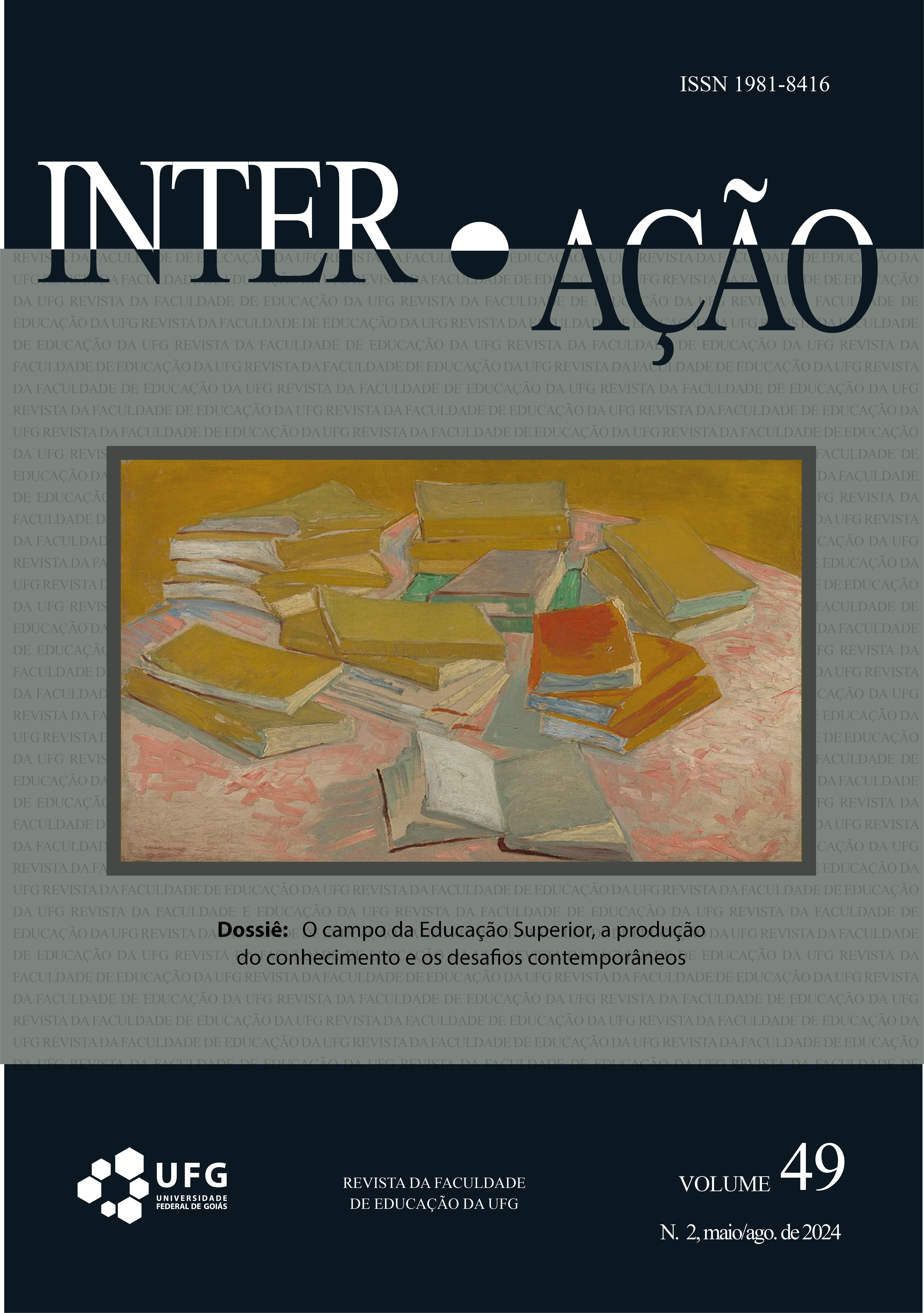PEDAGOGINGA: PROCESSOS EDUCATIVOS E LUTA ANTIRRACISTA A PARTIR DAS VIVÊNCIAS DA ASSOCIAÇÃO CULTURAL EU SOU ANGOLEIRO – BELÉM-PA
DOI:
https://doi.org/10.5216/ia.v49i2.79498Palavras-chave:
Capoeira Angola; Decoloniality Educational Processes; Pedagogy.Resumo
Este artigo é fruto de uma pesquisa de Mestrado em Educação que analisou os processos educativos da Capoeira Angola, a partir das vivências da Associação Cultural Eu Sou Angoleiro, em Belém-Pa. Objetivamos, assim, compreender como os processos educativos dessa manifestação possibilitam aos sujeitos aprendizes a construção de saberes e atitudes de resistência às colonialidades e sua contribuição à luta antirracista, configurando-se numa pedagogia decolonial. Este trabalho tem como base teórico-metodológica a investigação-ação participativa e os estudos decoloniais e afrocentrados. Como resultados, identificamos nos processos educativos da capoeira angola uma pedagogia ancorada na cosmovisão africana, que se contrapõe às colonialidades, problematizando-as e fazendo das resistências incorporadas nessa manifestação estratégias de luta antirracista e transformação social, a pedagoginga.
Downloads
Referências
ABIB, P. R. J. Capoeira Angola: Cultura popular e o jogo de saberes na roda. Salvador: EDUFBA, 2005.
ARAUJO, R. C. Iê, Viva meu Mestre: a Capoeira Angola da escola pastiniana´ como práxis educativa. Tese (Doutorado em Educação) – Faculdade de Educação, Universidade de São Paulo, São Paulo, 2004.
CARNEIRO. E. Religiões negras/negros bantos. Rio de janeiro, civilização brasileira, 1981.
FALS BORDA, O. Por la práxis: el problema de como investigar a realidade para transformala. In: FALS BORDA, Orlando e al. Crítica y política en Ciencias Sociales: el debate sobre teoria e prática. Bogotá: Punta de Lanza, 1978.
FANON, F. Pele Negra, Máscaras Brancas. Salvador: EDUFBA, 2008.
FERNANDES, F. O Negro no Mundo dos Brancos. Difusão Européia do Livro, São Paulo. 1972.
FREIRE, P. Pedagogia do Oprimido. 29ed. Rio de Janeiro: Paz e Terra, 1987.
FREIRE, P. Pedagogia da Esperança: um reencontro com a Pedagogia do Oprimido. Rio de Janeiro,Paz e Terra, 1992, 245 p.
GOMES, N. L. O Movimento Negro e a intelectualidade negra descolonizando os currículos. In: COSTA, Joaze Bernardino et al. (Org.). Decolonialidade e pensamento afrodiaspórico. Belo Horizonte: Autêntica Editora, 2019. p. 223-246
LEAL, L. A. P. A política de capoeiragem: A história social da capoeira e do boi-bumbá no Pará republicano (188-1906). Salvador: EDUFBA, 2008.
MIGNOLO, W. Desobediência epistêmica: a opção descolonial e o significado de identidade em política. Cadernos de Letras da UFF, n. 34, p. 287-324, 2008.
MOTA NETO, J. C. Por uma Pedagogia Decolonial na América Latina: reflexões em torno da obra de Paulo Freire e Orlando Fals Borda. Curitiba. CRV, 2016.
MUNANGA, K. (Org.). Superando o Racismo na Escola. Brasília: MEC- SECAD, 2005.
PETIT, S. H. Pretagogia: Pertendmento, Corpo-Dança Afroancestral e Tradição Oral Contribuições do Legado Africano para a Implementação da Lei n2 10.639/03 /. - Fortaleza: EdUECE, 2015.
OLIVEIRA, V. de. Frevo capoeira e passo. 2. ed. Recife: Cia Ed de Pernambuco, 1985.
OLIVEIRA, E. Filosofia da ancestralidade: corpo e mito na filosofia da educação brasileira. Ceará: Universidade Federal do Ceará, 2007
REGO, V. Capoeira Angola: ensaio sócio etnográfico. Salvador: Ed. Itapuã,
REIS, J. J. e SILVA, E. Negociações e Conflito: a resistência negra no Brasil escravista. São Paulo: Companhia das Letras, 1989.
ROSA, A. S. da. Imaginário, corpo e caneta: matriz afro-brasileira em educação de jovens e adultos. 2009. Dissertação (Mestrado em Educação) - Faculdade de Educação, Universidade de São Paulo, São Paulo, 2009. DOI: https://doi.org/10.11606/D.48.2009.tde-23032010-144503. Disponível em: https://www.teses.usp.br/teses/disponiveis/48/48134/tde-23032010-144503/publico/allansantos.pdf. Acesso em: 1 jul. 2023.
ROSA, A. S. da. Pedagogia, Autonomia e mocabagem. São Paulo: Póllen, 2019.
RUFINO, Luiz. Pedagogia das Encruzilhadas- Rio de Janeiro: Mórula Editorial, 2019
SALLES, V. A defesa pessoal do Negro – A capoeira no Pará. O negro na formação da sociedade paraense. Belém: Parakatu, 2004.
SILVA, G. C. e. Pretagogia: construindo um referencial teórico-metodológico de matriz africana para a formação de professores/as. 2013. 243f. – Tese (Doutorado em Educação) – Universidade Federal do Ceará, Programa de Pós-graduação em Educação Brasileira, Fortaleza (CE), 2013.
TEIXEIRA, C. P. V. Nas voltas que o mundo deu, nas voltas que o mundo dá: um estudo sobre ritual e performance na capoeira angola em Belém. 2010. 104 f. Dissertação (Mestrado) - Universidade Federal do Pará, Instituto de Filosofia e Ciências Humanas, Belém, 2010. Programa de Pós-Graduação em Ciências Sociais.
WALSH, C. Interculturalidade crítica e pedagogia decolonial: in-surgir, re-existir e re-viver. In. CANDAU, Vera Maria (Org.). Educação intercultural na América Latina: entre concepções, tensões e propostas. Rio de Janeiro: 7 Letras, 2009.
Publicado
Como Citar
Edição
Seção
Licença
Copyright (c) 2024 Alessandra Ferreiras Marinho, João Colares da Mota Neto

Este trabalho está licenciado sob uma licença Creative Commons Attribution-NonCommercial 4.0 International License.
A Inter-Ação utiliza como base para transferência de direitos a licença Creative Commons Attribution 4.0 para periódicos de acesso aberto (Open Archives Iniciative - OAI). Por acesso aberto entende-se a disponibilização gratuita na Internet, para que os usuários possam ler, baixar, copiar, distribuir, imprimir, pesquisar ou referenciar o texto integral dos documentos, processá-los para indexação, utilizá-los como dados de entrada de programas para softwares, ou usá-los para qualquer outro propósito legal, sem barreira financeira, legal ou técnica.
Autores que publicam neste periódico concordam com os seguintes termos:
1) Autores mantém os direitos autorais e concedem à revista o direito de primeira publicação, com o trabalho simultaneamente licenciado sob a Licença Creative Commons Attribution que permite o compartilhamento do trabalho com reconhecimento da autoria e publicação inicial nesta revista.
2) Autores têm autorização para assumir contratos adicionais separadamente, para distribuição não-exclusiva da versão do trabalho publicada nesta revista (ex.: publicar em repositório institucional ou como capítulo de livro), com reconhecimento de autoria e publicação inicial nesta revista.
3) Autores têm permissão e são estimulados a publicar e distribuir seu trabalho online (ex.: em repositórios institucionais ou na sua página pessoal) a qualquer ponto antes ou durante o processo editorial, já que isso pode gerar alterações produtivas, bem como aumentar o impacto e a citação do trabalho publicado.















